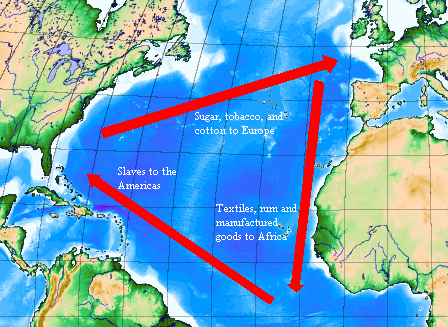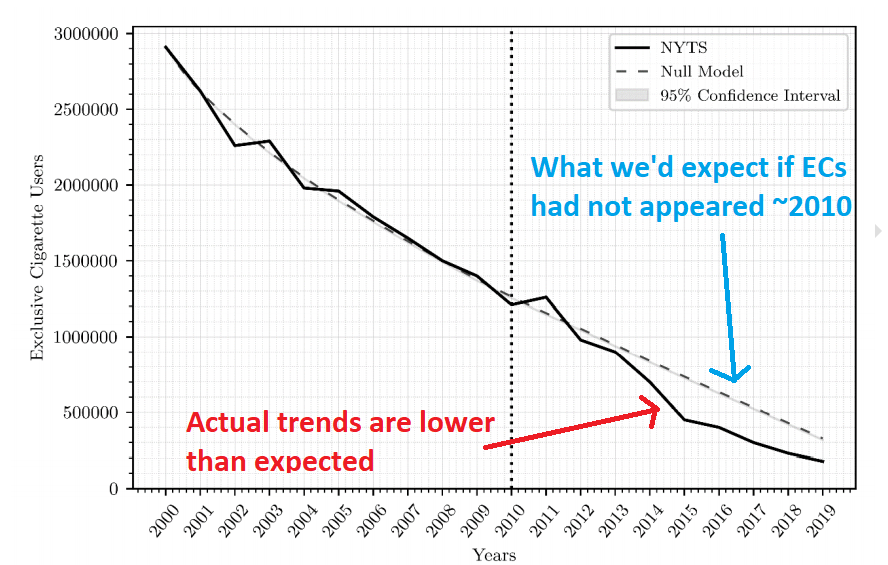In yesterday’s discussion of colonies, #AdamSmith was really good on a lot of issues—particularly on condemning murdering Indigenous people, despoiling colonies in search of gold that ain't there, and then pretending you're doing it all for God. #WealthOfTweets #SmithTweets
That phrase “give place to” cloaks a lot of horrors. (IV.vii.b.1) #WealthOfTweets #SmithTweets
Workers + land + money ➡ kids!
And more people ➡ prosperity. (IV.vii.b.2–3) #WealthOfTweets #SmithTweets

Other European colonies were less immediately splendid. Being less immediately splendid helped with the independence. (IV.vii.b.7) #WealthOfTweets #SmithTweets

https://t.co/7l6vzHdlm5



Like. Sure. But MAN. He couldn't have said that about the triangular trade?! Especially since he compares these restrictions to slavery. (IV.vii.b.44) #WealthOfTweets #SmithTweets
Politically, they're independent: local legislatures, representative government, non-tyrannical executives. (IV.vii.b.50–51) #WealthOfTweets #SmithTweets
Smith does not like slavery. He’s opposed for moral and economic reasons.
But he does need to analyze it. (IV.vii.b.54) #WealthOfTweets #SmithTweets
English planters, having more liberty, used it to be awful. (IV.vii.b.54) #WealthOfTweets #SmithTweets
On both counts, this is where the focus on freedom in the English colonies is a bad thing. (IV.vii.b.54–55) #WealthOfTweets #SmithTweets
They were begun in folly and injustice and led to the destruction of harmless peoples. (IV.vii.b.58–59) #WealthOfTweets #SmithTweets
No points awarded for war and persecution. #Good (IV.vii.b.61–62) #WealthOfTweets #SmithTweets

More from @AdamSmithWorks
We have to pause now, because we have to have a whole new tweet thread on #AdamSmith and “savage nations,” because he’s going to keep using this kind of phrase, so we need to talk about it. #WealthOfTweets #SmithTweets
Please know that your friendly SmithTweeters give heavy side-eye to Smith’s use of phrases like “savage nations” and “naked savages” and so on. They are obviously shocking to the modern ear, and they should be. #WealthOfTweets #SmithTweets
“Well, it’s the 18th century, what do you expect?” just isn't a sufficient explanation. #WealthOfTweets #SmithTweets
The 21stC changed from talking about the First World/Third World to talking about developed/developing nations. That’s a good change and a respectful one. The terms we use for countries will continue to change. See:
Probably the best way to think about Smith’s use of the term “savage nations” is to think of it as its own developmental stage on its way to a better set of terms for talking about the differences among nations. https://t.co/2wr7yACEv5 #WealthOfTweets #SmithTweets
Please know that your friendly SmithTweeters give heavy side-eye to Smith’s use of phrases like “savage nations” and “naked savages” and so on. They are obviously shocking to the modern ear, and they should be. #WealthOfTweets #SmithTweets
“Well, it’s the 18th century, what do you expect?” just isn't a sufficient explanation. #WealthOfTweets #SmithTweets
The 21stC changed from talking about the First World/Third World to talking about developed/developing nations. That’s a good change and a respectful one. The terms we use for countries will continue to change. See:
Probably the best way to think about Smith’s use of the term “savage nations” is to think of it as its own developmental stage on its way to a better set of terms for talking about the differences among nations. https://t.co/2wr7yACEv5 #WealthOfTweets #SmithTweets
More from Society
Sandbank Danger, A Thread

Controversy Has Been Caused By The Digging Of A Narrow Channel By A Resort On A Sandbank Near K. Hinmafushi.

Hinmafushi Council President Shan Ibrahim Stated To Sun That The Resort, Which Dug The Trench Creating A River On The Sandbank, Did Not Have Ownership Over The Sandbank.
Officials From The Island Of Hinmafushi Had Traveled To The Sandbank To Stop The Process Of Digging The Trench When They Became Aware Of It, Said Shan.
Officials Were Now Redepositing The Sand Removed From The Sandbank.

Controversy Has Been Caused By The Digging Of A Narrow Channel By A Resort On A Sandbank Near K. Hinmafushi.

Hinmafushi Council President Shan Ibrahim Stated To Sun That The Resort, Which Dug The Trench Creating A River On The Sandbank, Did Not Have Ownership Over The Sandbank.
Officials From The Island Of Hinmafushi Had Traveled To The Sandbank To Stop The Process Of Digging The Trench When They Became Aware Of It, Said Shan.
Officials Were Now Redepositing The Sand Removed From The Sandbank.
— Ahmed Aznil (@AhmedAznil) January 21, 2021
It is simply not correct to point fingers at wind & solar energy as we try to understand the situation in TX. The system (almost) had a plan for weather (almost) like this. 1/x
It relied on very little wind energy - that was the plan. It relied on a lot of natural gas - that was the plan. It relied on all of its nuclear energy - that was the plan. 2/x
There was enough natural gas, coal and nuclear capacity installed to survive this event - it was NOT "forced out" by the wind energy expansion. It was there. 3/x
Wind, natural gas, coal and nuclear plants all failed to deliver on their expectations for long periods of time. The biggest gap was in natural gas! The generators were there, but they were not able to deliver. 4/x
It may be fair to ask why there is so much wind energy in ERCOT if we do NOT expect it to deliver during weather events like this, but that is an entirely different question - and one with a lot of great answers!! 5/x
Conservatives are using the Texas power chaos to argue against climate policy even as fossil-generated power outages dwarf the amount of renewables knocked offline during the historic deep freeze. President Biden and progressives have been slow to respond.https://t.co/UajKhptEAU
— E&E News (@EENewsUpdates) February 17, 2021
It relied on very little wind energy - that was the plan. It relied on a lot of natural gas - that was the plan. It relied on all of its nuclear energy - that was the plan. 2/x
There was enough natural gas, coal and nuclear capacity installed to survive this event - it was NOT "forced out" by the wind energy expansion. It was there. 3/x
Wind, natural gas, coal and nuclear plants all failed to deliver on their expectations for long periods of time. The biggest gap was in natural gas! The generators were there, but they were not able to deliver. 4/x
It may be fair to ask why there is so much wind energy in ERCOT if we do NOT expect it to deliver during weather events like this, but that is an entirely different question - and one with a lot of great answers!! 5/x
You May Also Like
The YouTube algorithm that I helped build in 2011 still recommends the flat earth theory by the *hundreds of millions*. This investigation by @RawStory shows some of the real-life consequences of this badly designed AI.
This spring at SxSW, @SusanWojcicki promised "Wikipedia snippets" on debated videos. But they didn't put them on flat earth videos, and instead @YouTube is promoting merchandising such as "NASA lies - Never Trust a Snake". 2/

A few example of flat earth videos that were promoted by YouTube #today:
https://t.co/TumQiX2tlj 3/
https://t.co/uAORIJ5BYX 4/
https://t.co/yOGZ0pLfHG 5/
Flat Earth conference attendees explain how they have been brainwashed by YouTube and Infowarshttps://t.co/gqZwGXPOoc
— Raw Story (@RawStory) November 18, 2018
This spring at SxSW, @SusanWojcicki promised "Wikipedia snippets" on debated videos. But they didn't put them on flat earth videos, and instead @YouTube is promoting merchandising such as "NASA lies - Never Trust a Snake". 2/

A few example of flat earth videos that were promoted by YouTube #today:
https://t.co/TumQiX2tlj 3/
https://t.co/uAORIJ5BYX 4/
https://t.co/yOGZ0pLfHG 5/
























